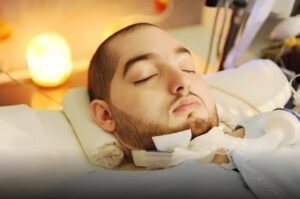HOLY LAND OR “HOLY” WAR?
If a place is holy, shouldn’t there be peace associated with it? I always thought the word ‘holy’ and ‘peace’ is synonymous with each other. It seems to naturally go together, the way a glove fits a hand.
But such is not the State of Israel. The opposite holds true in this case. ‘Holy’ yes, ‘peaceful’, no. This majestic place is perhaps the most conflicting in today’s world. Both of my trips to Israel in 2016 and 2019 have been exceptional. Not because of its antiquated beauty. Not because of the many sumptuous restaurants I dined in, or the truly delicious and fresh food I indulged in. Not because of its dazzling Mediterranean beaches or the stunning, magnificent and picturesque view from several helicopter rides. Not because of visiting spectacular landmarks or significant monuments. Not because of the diverse and dynamic religious, community and government officials I met. But rather, of the profound connection that tugs at my heartstrings. I’m not a Jew, I’m not a Christian, I’m not a Palestinian, but I’m a Muslim. I share the same commonality that all Muslims feel around the world. That deep-rooted fixation with Masjid Al-Aqsa and our Prophet Muhammad’s (PBUH) ascension to heaven centuries ago. Our 3rd Holiest Site, praying in this revered spot is a privilege and one receives multifarious blessings even if its just one prayer offered. And of course, not forgetting all of the other Prophets, such as Ibrahim (PBUH) and Jesus, (PBUH), etc., that inhabited this ancient and fascinating land that holds such sacred history for so many faiths.
But what good does it do if one cannot pray/reside there peacefully? I recalled returning from the West Bank, Ramallah in both years and our private bus being deterred at a checkpoint. Soldiers with long rifles entered and demanded to see our passports. On one of those instances I felt I was targeted because I was the only hijabi on the bus. They accosted me and spent a long time inspecting my passport and talking amongst themselves. My passport was handed around like a piece of meat for inspection and my face peered at. My Egyptian brother seated behind me received similar treatment. Him being an Arab Muslim only served to heighten their suspicions. Finally what seemed like an eternity, our passports were handed back and we were given the go ahead to proceed. I definitely felt we were their main focus because of our religion. The other members of my delegation, made up of largely non-Muslims were not subjected to the same scrutiny.
On another occasion, a Pakistani brother and I went to pray Jummah at Masjid Al-Aqsa and the Dome of Rock. Following the Jummah, we advanced the few steps leading into the Jewish Quarter. Before gaining admittance, one has to go through security and a metal detector, much like the airport. At one of the gates the security guard halted us, looking us over. She radioed her headquarter and fired off in Hebrew. After much deliberation we were allowed in, passing through the metal detector, while our backpacks went through the scanner. As we sauntered towards the Western Wall, our Palestinian guide related what had transpired between the guard and headquarter. Fluent in Arabic, Hebrew and English, he mimicked her: “that we are a Muslim couple, dressed in traditional Islamic garments and seeking admittance to the Jewish quarter.” I laughed, maybe a little harshly, knowing we will be under surveillance as we languished in the Jewish quarter. My Pakistani brother was not dressed in Islamic garments, but was sporting a beard. I, on the other hand was decked out in full Islamic attire. Enough to raise a red flag, I presumed. Back in 2016 as I dwelled in the Jewish Quarter, a soldier confronted me and inquired if I was a Muslim. I answered in the affirmative. He repeated the question looking directly into my eyes. I repeated my answer. Okay he finally responded, nodding his head, giving me permission to carry on. It was not uncommon to see soldiers permeating the Holy Sites and at certain checkpoints. In retrospect I wondered how many of those long rifles I had seen during my two short visitations. More than I saw during my entire lifetime I had mused.
In conjunction, I recollected the discussion with LT. Col. (res.) Sarit Zehavi, Founder and CEO of Alma Research and Education Center regarding the Security Challenges in Northern Israel. It was onerous to be near a site where there are tunnels, where hostages were taken, where soldiers were killed, etc. Sure we hear this kind of news frequently in the States, but it’s different when it’s staring you in the eye. It was agonizing to listen to these kinds of stories. I tried to shake off the dreaded feeling and the images of the pictures that was painted, as I envision these lives being lost. This was the stark reality of Israel.
Perhaps the most astounding of all was my visit to Kibbutz Nahal Oz. The very day we visited, there was an attack hours earlier. While we traveled with our own security trailing us, no such privileges were given to the locals who occupied the areas of West Bank and the Gaza Strip or anywhere else for that matter. Kibbutz Nahal Oz was less than half a mile from the Gaza Border. As we listened with rapt attention to Yael Raz Lachyani, Kibbutz Spokesperson for Nahal Oz recount some of the horrific ordeals of living in a compound of approximately 450, of having literally seconds to find their safe house of an impending rocket, of losing some of their children during these attacks, there wasn’t a dry eye in the room. We visited the memorial of these children whose lives were cut short. Precious lives that ended prematurely. As a mother of three myself, I felt for the mothers of these dead children. It was certainly eerie being next to the Gaza Border. I felt we were surrounded by imminent death. I had stared off into the distance, gazing at the Strip, feeling choked up and wondering about the lives there. Feeling helpless, powerless and angry all at the same time, of all the lives that was lost in a battle that has raged on for far too long. “When will it end”? I pondered for the umpteen time.
Who will be the next victim to be stabbed? A Jew or a Palestinian? Which of its neighboring borders will be under attack? When will Gaza receive its next rocket? How many more innocent children will lose their lives on a Kibbutz? And finally, will the present government be reelected come September 2019? And if so, will things remain constant? Will there be another 6-day war? Or will there be another Oslo Accord? Will the progressive growth of interfaith relations have any effect on the Knesset?
As someone who promotes interfaith harmony and a peaceful co-existence for the past 14 years in collaboration with the Museum of Jewish Heritage, among Muslim and Jewish middle school students, I live to see peace in the Middle East. Its something I feel intensely passionate about. A day when passports will be locked up safely in a bank’s deposit box, and not the Palestinians locked up behind bars, or a Jew being stabbed. There will be no more soldiers patrolling around with long rifles and no more checkpoints. Because ALL lives deserve to live in peace, prosperity and dignity.
As a Muslim, I will love to revisit Israel, savor its beauty, pray in its Holy Sites and reminisce about the time when our beloved prophet was there, and I wonder if that future visit, the current situation will remain stagnant or if the conflict is resolved, will I see and experience things differently?
***
With heartfelt thanks to AJC and PI for an epic experience, for opening our hearts and cultivating our minds. Special thanks to Michael Schmidt, AJC’s Director, for planning and leading an extraordinary delegation.
By Shireena Drammeh
Principal and Co-Founder of the Islamic Leadership School in the Bronx, New York City.















